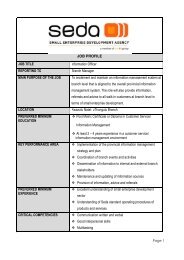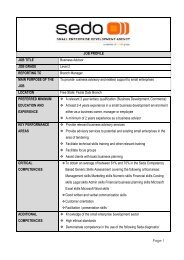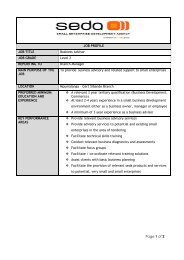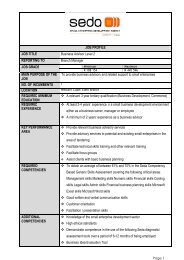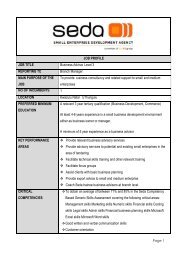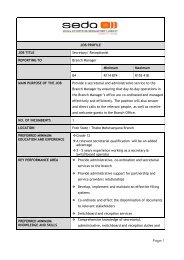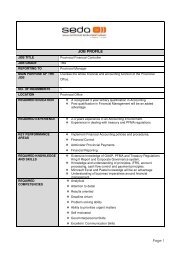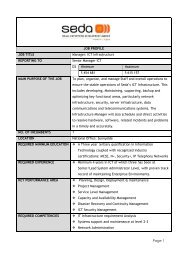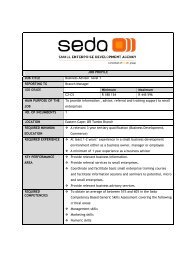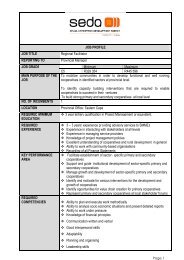Assessment of Cooperatives in the Poultry Industry - 2013.pdf - Seda
Assessment of Cooperatives in the Poultry Industry - 2013.pdf - Seda
Assessment of Cooperatives in the Poultry Industry - 2013.pdf - Seda
You also want an ePaper? Increase the reach of your titles
YUMPU automatically turns print PDFs into web optimized ePapers that Google loves.
Research Report: Address<strong>in</strong>g <strong>the</strong> Needs, Opportunities and Challenges <strong>of</strong> <strong>Cooperatives</strong><br />
and Collectively Owned Enterprises <strong>in</strong> <strong>the</strong> <strong>Poultry</strong> and Related Industries<br />
Service providers are appo<strong>in</strong>ted to assist with <strong>the</strong> provision <strong>of</strong> tra<strong>in</strong><strong>in</strong>g, as well as certa<strong>in</strong> o<strong>the</strong>r forms<br />
<strong>of</strong> support. Different forms <strong>of</strong> support are provided depend<strong>in</strong>g on <strong>the</strong> size <strong>of</strong> <strong>the</strong> cooperative. For<br />
example, assistance with <strong>in</strong>puts is only provided to large-scale cooperatives.<br />
In certa<strong>in</strong> cases a service provider provides mentorship to <strong>the</strong> cooperatives for a period <strong>of</strong> six<br />
months to a year. SEDA noted that despite this support, cooperatives <strong>in</strong> many cases fail to succeed.<br />
However, if <strong>the</strong>re is no mentorship whatsoever, <strong>the</strong> chances <strong>of</strong> failure are higher.<br />
Monitor<strong>in</strong>g is provided by SEDA itself. Monitor<strong>in</strong>g is required several times annually and is done<br />
when <strong>the</strong> employee <strong>in</strong> charge <strong>of</strong> <strong>the</strong> area is able to visit and assess. Managers were previously<br />
divided per sector; however, this has changed. Managers now operate regionally <strong>in</strong> order to ensure<br />
improved access to and monitor<strong>in</strong>g <strong>of</strong> projects.<br />
5.2. Recommended Interventions<br />
The recommended <strong>in</strong>terventions for improv<strong>in</strong>g support to poultry cooperatives touch on six broad<br />
categories <strong>of</strong> constra<strong>in</strong>t or <strong>in</strong>tervention, namely:<br />
<br />
<br />
<br />
<br />
<br />
<br />
<strong>the</strong> lack <strong>of</strong> equipment faced by many cooperatives<br />
<strong>the</strong> low levels <strong>of</strong> skill and <strong>the</strong> scope for tra<strong>in</strong><strong>in</strong>g<br />
<strong>the</strong> barriers to entry <strong>in</strong> ga<strong>in</strong><strong>in</strong>g market access<br />
<strong>the</strong> struggle faced by cooperatives <strong>in</strong> be<strong>in</strong>g competitive <strong>in</strong> <strong>the</strong> market<br />
<strong>the</strong> possibilities for enhanced communication and <strong>in</strong>formation dissem<strong>in</strong>ation<br />
<strong>the</strong> possible paths <strong>of</strong> development for egg and broiler cooperatives separately.<br />
5.2.1.<br />
Address<strong>in</strong>g Deficiencies <strong>in</strong> Skills Development Support<br />
The analysis <strong>in</strong> Section 4 <strong>in</strong>dicated that cooperatives require additional tra<strong>in</strong><strong>in</strong>g <strong>in</strong> a number <strong>of</strong> areas.<br />
Skill levels are shown to be low <strong>in</strong> f<strong>in</strong>ancial, managerial and technical skills. Some <strong>of</strong> <strong>the</strong>se may also<br />
stem from low levels <strong>of</strong> basic education amongst cooperative members.<br />
In addition to low skill levels, cooperatives struggle with accountability, leadership and management.<br />
<strong>Industry</strong> experts highlighted <strong>the</strong> concern that a lack <strong>of</strong> leadership exists with<strong>in</strong> cooperatives. This<br />
<strong>of</strong>ten results <strong>in</strong> poor or no plann<strong>in</strong>g, as no s<strong>in</strong>gle member is accountable and ready to take on <strong>the</strong><br />
challenges <strong>of</strong> long-term plann<strong>in</strong>g.<br />
Recommendations to deal with skills and leadership <strong>in</strong>clude:<br />
<br />
Develop a comprehensive support approach:<br />
In order to address <strong>the</strong> problems <strong>of</strong> skill and leadership, it is important that a comprehensive<br />
support approach be <strong>in</strong>ternally formulated, to ensure that all cooperatives are taken<br />
through a best-practice development path. It is, <strong>the</strong>refore, recommended that SEDA<br />
80 | P a g e U r b a n - E c o n : D e v e l o p m e n t E c o n o m i s t s



